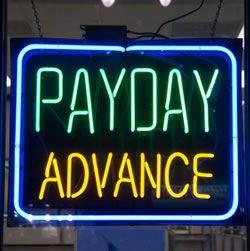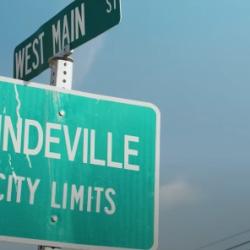The National Association of Evangelicals has come out against predatory lending and payday loans. That’s good! Yay NAE!
The NAE is an umbrella group representing dozens of small Protestant denominations and more than 45,000 churches. These are white evangelical folk, so they tend to be very politically conservative. Or, rather, they tend to define their faith in terms that are politically conservative — their religious identity is both political and conservative. What that often means in practice is that they double-check their impulses and instincts to ensure they’re not getting out of line with orthodox conservative politics.
 As I often note here, most of these folks are Very Nice People — far more like Ned Flanders than like James Dobson (even though, inexplicably, they mostly like Dobson). And like most Very Nice People, when they begin to understand the facts of predatory lending — to see the outrageous interest rates and cascading fees forced upon the poor and defenseless — they think it seems wrong. As in, there ought to be a law against it wrong.
As I often note here, most of these folks are Very Nice People — far more like Ned Flanders than like James Dobson (even though, inexplicably, they mostly like Dobson). And like most Very Nice People, when they begin to understand the facts of predatory lending — to see the outrageous interest rates and cascading fees forced upon the poor and defenseless — they think it seems wrong. As in, there ought to be a law against it wrong.
Yet when they double-check to see if this is an acceptable reaction, they find that this view has been framed as dangerously liberal. It’s something championed by Satanic baby-killers like Elizabeth Warren and Eric Holder, and agreeing with people like that can get you in a lot of trouble in the white evangelical world.
So the first Good Thing about the NAE’s resolution against predatory lending is that it gives members of the white evangelical tribe permission to be against predatory lending. It tells them that this is an issue on which they are allowed to view government action and legal regulation favorably, and that this is an issue on which they are permitted to agree with liberals without risking demerits on their permanent record.
The resolution itself is short and rather vague. That’s by design. Here’s the key part:
The NAE calls on lenders to design loan products that do not exploit poor and vulnerable borrowers. We call on the Consumer Financial Protection Bureau to investigate predatory lending abuses and to establish just regulations that protect consumers, particularly the most poor and vulnerable among us, from exploitation.
That bit about the CFPB sounds a bit like it was written by someone who’s never heard of the agency and imagines they’re inventing the idea of it. It’s a bit like someone calling on NASA to begin exploring space with, like, rockets and telescopes and stuff.
But the vague generality of that makes this resolution more useful when it comes to its primary function. Most denominations and interdenominational associations have a resolutions process something like the NAE’s because these organizations also have a governmental affairs office. In other words, they have lobbyists — professional employees in Washington, DC, whose job it is to influence policy makers on behalf of the organization.
Those lobbyists are authorized to speak on behalf of the organization and on behalf of all of its members. As such, they’re only permitted to address “issues” that the organization and its members have taken an official position on.
That’s why, for example, the introduction of laws intended to stop human trafficking produced a volley of denominational resolutions putting those groups on record in support of legal efforts to oppose human trafficking. Without such resolutions, the lobbyists representing those groups and their members were not empowered to support such legislation.
So now the NAE’s executives have permission to speak out in support of the CFPB when it investigates predatory lending and now the NAE’s government relations people are authorized to support “just regulations that protect consumers, particularly the most poor and vulnerable among us, from exploitation.” And that’s all good.
NAE’s resolution also includes some language about what local congregations can do to address the problem of predatory lending:
Most families experience emergency needs from time to time. Churches, charities and employers can and do help with gifts or loans in times of personal crisis.
That’s good — such “gifts and loans” can, indeed, keep desperate people from having to turn to the legal loan sharks who might otherwise provide the $200 needed in an unforeseen emergency, but will claw back $2,000 for the privilege.
I also like that the NAE doesn’t just commend the practice of extending such gifts and loans to churches and charities. They also say this is something that employers should do to respond to people in need. I’d like to hear that preached in more pulpits.
But he NAE’s other piece of advice for local congregations is, alas, less helpful:
They can also offer financial literacy classes and model the virtues of disciplined saving, delayed gratification and investment for future needs.
It’s possible to promote financial literacy without descending into a cluelessly cruel form of victim-blaming. You can usually tell who’s getting that right because they don’t use the words “financial literacy.”
Poor people do not need to be taught anything about “delayed gratification.” Poor people know more about delayed gratification than any rich person will ever understand. The poor are not poor because they lack “virtues.” The poor are poor because they lack money.
This part of NAE’s resolution veers into nasty Dave Ramsey territory. Sure, predatory lending is bad, too, yesbutofcourse, but did you see what those poor people were wearing? They brought this on themselves. Sigh.
Fortunately, that odious little aside is tangential to the main purpose and function of the NAE’s resolution. That main purpose, again, is that the group’s executives and lobbyists and members have now given themselves permission to support “just regulations that protect consumers.”
Here’s hoping they will.
















